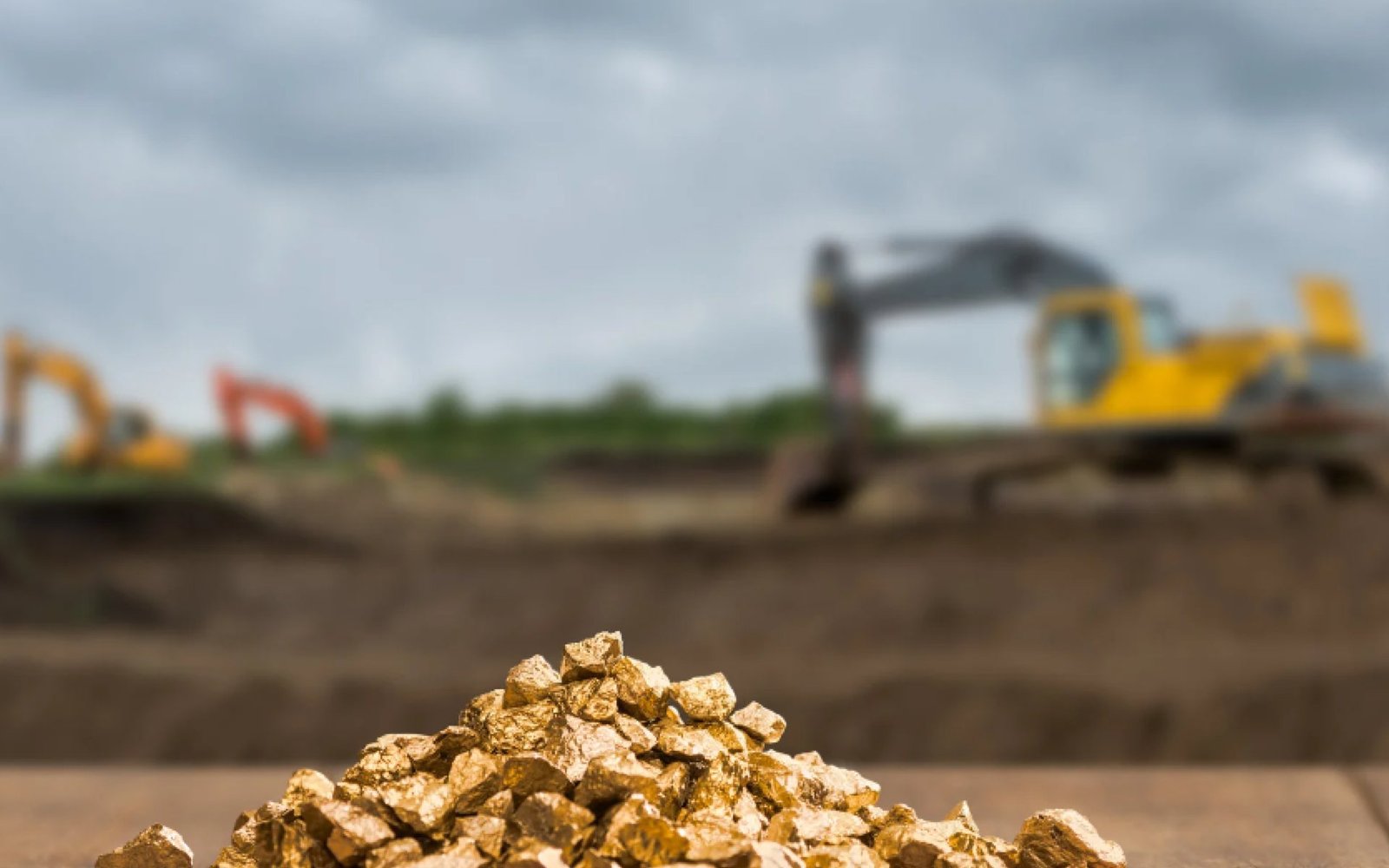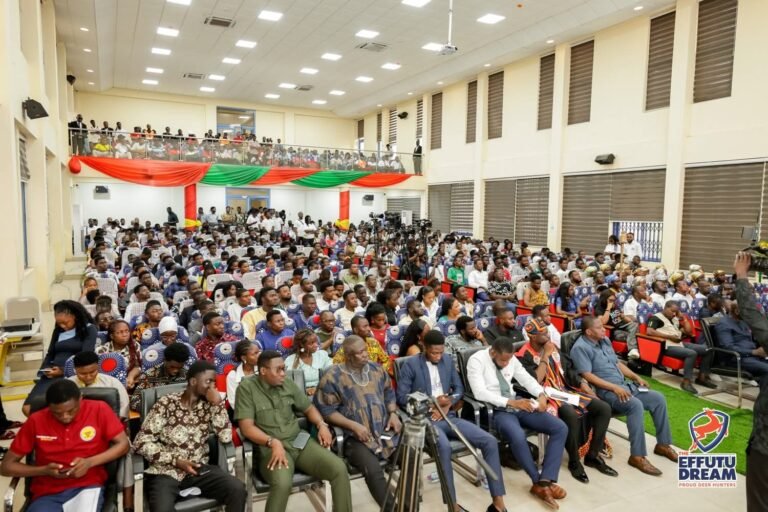
By Bright Philip Donkor
The National Protocol Director of the New Patriotic Party (NPP), Kwadwo Afari, has called on the government and policymakers to grant equity rights in mineral wealth to individual landowners rather than politically connected cronies.
This, he said, would represent a fundamental restructuring of Ghana’s mineral ownership regime, and ensure that landowners become active stakeholders in the wealth generated from their lands, rather than bystanders in a system that has historically excluded them from the benefits of resource extraction.
Mr. Afari made the call in an interview with the Daily Statesman yesterday in response to President John Dramani Mahama’s recent declaration that “it is time for Ghanaians to own gold mines and benefit from the country’s mineral wealth”. The President said this after his brother, Ibrahim Mahama, supposedly acquired the Black Volta Gold Project, a gold mine, using his Engineers & Planners (E&P) firm.
According to Mr. Afari, the current arrangement, where the state holds all mineral rights, and often awards concessions to politically favoured individuals, had created deep inequities, particularly for rural families whose lands contain valuable minerals such as gold, bauxite, and lithium. He stated that the failure to compensate landowners for surface destruction is no longer justifiable, especially in an era where mining generates billions in revenue for private companies and government affiliates. He added that providing fair compensation could serve as a critical step toward curbing the menace of illegal mining, commonly known as galamsey.
To this end, Mr. Afari stressed: “If we truly believe in fairness, equity and justice, then the people whose lands hold these minerals must also hold a stake in what comes out of them. We cannot keep enriching a few in Accra while the landowners remain poor”.
Aberration?
Mr. Afari further critiqued Ghana’s existing framework under Article 257(6) of the 1992 Constitution, arguing that although the law vests all natural mineral resources in the President on behalf of the people, its implementation had grossly neglected the very individuals on whose lands these minerals are found.
Ghana’s Constitution under Article 257(6) provides: “Every mineral in its natural state in, under or upon any land in Ghana, rivers, streams, water-courses throughout Ghana, the exclusive economic zone and any area covered by the territorial sea or continental shelf is the property of the Republic of Ghana and shall be vested in the President on behalf of, and in trust for the people of Ghana.”
While this has been the basis for state control over mineral exploitation, Mr. Afari believes the law is outdated and out of sync with equitable ownership principles.
“This law is an aberration. In Ghana, land doesn’t belong to the state. It belongs to families and individuals, unlike countries such as Canada and the U.S. where the crown or the state owns large portions of land,” he argued.
“So, why don’t we make the argument that while we support the constitutional provision, it is time for individual landowners to own the mineral and equity rights under their lands? Instead, what we are seeing is the appropriation of that right to political cronies. That is not justice,” he stated.
He explained that the traditional Ghanaian system recognised land as belonging to people and families, not chiefs or government, aside from stool lands which only served the occupancy of whoever became a chief. Mr. Afari contended that this deeply rooted customary structure should inform modern resource policy.
Mineral equity reforms
Mr Kwadwo Afari further urged the country to take bold inspiration from international best practices in resource governance by granting mineral equity rights to local landowners. He explained there was a compelling global precedent that supported a fairer and more inclusive mineral ownership model—one that benefits not just the state, but the actual custodians of the land.
To buttress his argument, Mr. Afari referenced models from the United States, Canada, Australia, and South Africa, where landowners either fully or partially benefit from the wealth extracted beneath their lands.
“These countries have demonstrated that it is possible to protect national interests while also ensuring equity for those whose lands bear the resource burden,” he said.
Global examples
In the United States, particularly in mineral-rich states such as Texas and North Dakota, private landowners have the right to own both surface and mineral rights. Mr. Afari noted that these rights allow individuals and families to lease or sell mineral access and earn royalties from mining activities. He pointed to the General Mining Law of 1872 and common law principles of property severance, which had enabled farmers, ranchers, and ordinary citizens to build intergenerational wealth from oil, gas, and mineral resources.
Turning to Canada, he explained that while most minerals are technically owned by the Crown, private ownership of mineral rights exists in provinces such as Alberta. More notably, indigenous communities in Canada are entitled to negotiated arrangements called Impact and Benefit Agreements (IBAs). These agreements, underpinned by Section 35 of the Constitution Act, 1982, often include royalty payments, equity stakes, and dedicated community development funds.
In Australia, Mr. Afari highlighted the Native Title Act of 1993, which grants traditional landowners the right to negotiate with mining companies before any operations commence. He also cited the landmark Mabo v Queensland (No. 2) decision, which affirmed Indigenous Australians’ legal rights to land and resources, unless specifically extinguished by law.
In South Africa, he pointed to the Mineral and Petroleum Resources Development Act (MPRDA), 2002, which vests mineral resources in the state but requires mining companies to implement black economic empowerment initiatives, share revenues with local communities, and ensure community participation in mining activities through provisions under the Mining Charter.
Equity non-negotiable
Mr. Afari also argued that Ghana’s current framework, where landowners receive minimal compensation, mostly for crop destruction, while others profit enormously from minerals, is outdated and unjust.
“In Ghana, many local landowners wake up to find excavators mining gold on their farms without their knowledge, let alone their consent. Equity ownership, not surface damage payments, must be the next frontier of justice,” he said.
“The real value of the land lies not in the surface, but beneath it—gold, bauxite, lithium. The families who have held these lands for generations must benefit from their natural wealth,” Mr. Afari stressed.
“If Mahama is sincere, then in the area where his brother owns a gold mine, at least 40 percent equity should go to the local landowners. His brother, Ibrahim Mahama, can still invest, but the people must not be left behind. They must become stakeholders not spectators,” he emphasised.
Mr. Afari stated that although legal frameworks for development exist across the globe and Ghana is no exception, the country continues to lack the political will to implement them effectively. He stressed that it was time for leaders to stop the pretense, end the practice of enriching a few cronies under the guise of development, and commit to a path that genuinely benefits the broader population.




